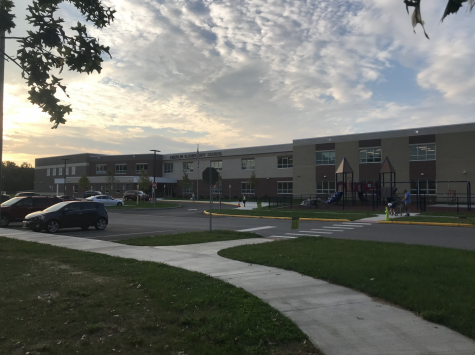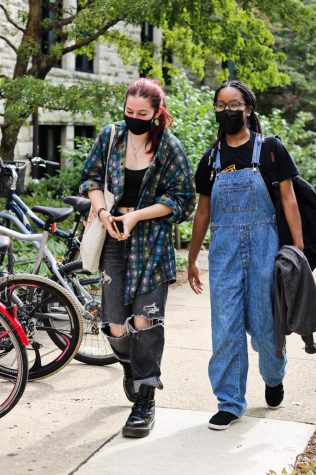College Departs from CDC Recommendations, No Longer Requires Testing for Individuals Exposed to COVID-19
The College released a statement to the student body last Saturday that a student on campus tested positive for COVID-19.
The College will no longer test vaccinated individuals who are exposed to COVID-19 unless they are symptomatic, according to an announcement earlier today. This change is in line with Ohio Department of Health and local guidelines but goes against the Centers for Disease Control and Prevention recommendations. The updated policy comes after a student tested positive for COVID-19 last weekend, the first known case on campus during the entire summer semester.
An ObieSafe update sent on August 7 informed the College community that a student had received a positive COVID-19 rapid test. Several other vaccinated people have been identified as close-contacts.
“We have identified a few students who were exposed, and all of them are fully vaccinated,” the statement reads. “Out of an abundance of caution, we will test these students with a PCR test on Monday and Tuesday. Based on CDC guidance they will not be quarantined. Of course, everyone should continue to wear a mask while indoors according to the College’s mask policy announced earlier this week. There are also protocols for management of unvaccinated individuals which will be used when needed.”
According to Campus Health Coordinator Katie Gravens, the test results of roughly half of the contact-traced individuals had come back as of Thursday afternoon and were all negative. She is not expecting any positive tests given that all of the exposed people are vaccinated.
While these close-contacts will be tested, in the future vaccinated individuals exposed to COVID-19 will not be tested by the College. In the wake of last weekend’s positive test and a recent change in the Ohio Department of Health’s testing policy, the College has decided to cease testing vaccinated individuals who are exposed to COVID-19.
“What we’ve learned through our consultations with Lorain County Public Health and by looking at the guidelines from the state is that, if you have people who are fully vaccinated and wearing masks, the chances of spread are extremely, extremely low,” Chief of Staff David Hertz said. “If one person does end up being positive, [but] both [people] are still vaccinated and still wearing masks, the chance of the other person getting [COVID-19] from that first person is extremely, extremely low.”
A July 29 announcement from ODH outlined that individuals who are exposed to COVID-19 do not have to quarantine or test unless they have symptoms.
“If you are exposed to COVID-19 and fully vaccinated, quarantining or testing after exposure is generally not necessary unless symptoms develop,” the statement reads.
However, on Monday, ODH updated its guidance for K–12 schools, saying that vaccinated students who are exposed to COVID-19 do not have to quarantine but must still undergo testing.
CDC guidance, updated July 27, recommends that vaccinated individuals undergo testing 3–5 days after close contact to someone with the virus.
“If you came into close contact with someone with COVID-19 get tested 3-5 days after the date of your exposure and wear a mask in public indoor settings for 14 days after exposure or until a negative test result,” the recommendation reads.
According to Hertz, the College made the decision to change its testing policy based on data and guidance from local health experts.
“If you are exposed, then what do you do after that?” Hertz said. “What [Gravens] is saying is you don’t have to get tested. If you’re having symptoms or if you’re not vaccinated, then you’d want to get tested for your own benefit. What we’re doing is we’re following the state guidelines, but then the CDC also has its own guidelines. It’s kind of complicated, but what they’ve told us is, ‘Look at the CDC guidelines, but utilize your local health department’s interpretation of that in their local guidelines.’”
Gravens said that students should continue masking, and that between the vaccine and masks, there is a low enough risk that testing is unnecessary, even in the case of COVID-19 exposure.
“As long as a person is vaccinated and they are wearing a mask, if they are exposed to someone who is positive, the only requirements will be that they have to continue to wear their mask indoors everywhere they go — which they should be doing anyway — but to be really vigilant about that,” Gravens said. “There is no need for [COVID-19] testing. So if you’re vaccinated and you have been exposed — and we will still do contact tracing so we will know everyone who has been exposed — we will check their vaccination status, but there is no need for [COVID-19] testing. They just need to wear the mask. They need to be monitoring their symptoms for 14 days. And, if they develop symptoms, they need to contact Student Health so that they can be evaluated and tested.”
Symptomatic students who go to the Student Health Center will receive a rapid test. If that test comes back positive, they will undergo PCR testing and go into isolation. In today’s announcement Gravens said that isolation will happen within a students’ residence; students will no longer be moved to a seperate dorm or facility. Additionally, Gravens said that students should not attempt to be tested off-campus.
“There is no need to test,” Gravens said. “Your public health experts are saying, ‘If you’re vaccinated, you don’t need to test.’ Part of what we’re trying to do right now is to educate people. We don’t want people testing unnecessarily. For one thing, you can have false positive results, and we have seen that. We have seen false positive results, everyone panics, all kinds of things happen. If you don’t need it, it would be like taking an antibiotic when you don’t have an infection. There’s no need to do that. So no, we will not be testing people just because they want to be tested. We will test people when testing is warranted and we discourage people from going out and getting tested [other] places. And, if policies need to change, we’ll change them. But this is where we are at this point in time.”
Last week, the College announced that students must be vaccinated within 45 days of the Federal Drug Administration granting full approval to a COVID-19 vaccine. However, faculty, staff, and outside vendors will not be subject to the same requirement — rather, the College highly encourages non-students to vaccinate. Some parents have expressed frustration that the College is not requiring vaccinations for faculty and staff.
“I am thrilled that Oberlin has mandated vaccines for the students but disappointed that there is not a mandate for faculty, staff, and contracted vendors such as dining and custodial staff,” Oberlin parent Kathy Waters Engstrom wrote in a message to the Review. “I am also disappointed that President Ambar did not explain the reason behind the elective mandate. Many parents have surmised that there may be political, labor, or recruitment concerns behind the lack of mandate.”
According to Hertz, the College decided to limit the vaccine requirement to students because of the close quarters in which students live and eat.
“The reason that we’re doing that is the congregate setting [in which students live] and the nature of how students interact with each other, versus faculty and staff,” Hertz said. “We’re not a bubble, and we know that our community interacts with the rest of the community. So our goal is to provide as safe a campus as we can. We think that by requiring of students that they get the vaccine — barring a very small number of exceptions — that’s the best way to keep our campus safe. If we do keep our campus safe, that to me is the best recruiting information that we can provide. … That said, we really strongly encourage all people who are coming to campus on a regular basis to get vaccinated.”
Gravens also emphasized that the College is still closely monitoring the impact of COVID-19 on campus.
“I hope everyone on campus will trust that we are monitoring the situation on a daily basis,” Gravens said. “We watch for changes in guidelines. We’re monitoring the data. If there is a positive, we’re going to be tracking that so that you don’t have to worry about it. We will worry about it for you, and we will let you know what needs to be done. If there are policies that need to change, we will change them because our goal is to keep you all safe, but also to let you have a full college experience.”








